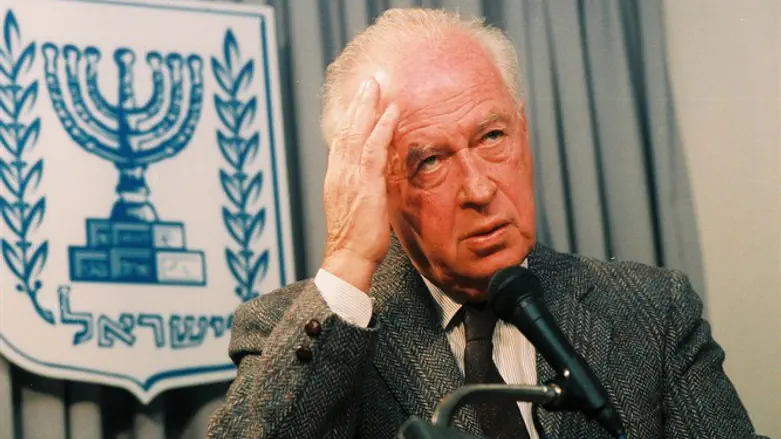
Until now, the controversy over inviting Henry Kissinger to speak at an upcoming Jewish conference in Manhattan has focused on his actions during the Yom Kippur War, his hostility to Soviet Jewry, and his mistreatment of Ambassador Daniel Patrick Moynihan.
But there is another important aspect to the debate: Kissinger’s harsh and vulgar treatment of Israeli Prime Minister Yitzhak Rabin.
The details of Kissinger’s mistreatment of Rabin are set forth in Prof. Gil Troy’s recent book, Moynihan’s Moment. Basing himself on previously unpublished internal memoranda and transcripts of Kissinger’s conversations with his aides, Troy presents a side of Kissinger that is not widely known—but should be.
The story began in early 1975. Kissinger undertook what was termed “shuttle diplomacy,” and it was aimed at getting Israel to make one-sided concessions to Egypt. He demanded that Prime Minister Rabin surrender the Mitla and Giddi mountain passes, two of the most strategic points in the entire Sinai Peninsula. Kissinger also insisted that Rabin surrender the Abu Rudeis oil fields in Sinai, which had the potential to make Israel energy-independent.
And what did Kissinger offer in exchange? A vague five year pledge of “non-belligerency” from the Egyptians. In other words, Israel would give up vital, tangible assets, and Egypt would be free to invade the Jewish state again in five years. No wonder Rabin hesitated to agree to those outrageous terms.
Kissinger was furious that Rabin was not immediately surrendering to all his demands. Israel was “bringing the world to the edge of war for three kilometers in the Giddi and eight kilometers in the Mitla,” Kissinger complained to his aides, according to Prof. Troy. Yes, the secretary of state accused Israel of provoking World War Three.
Kissinger’s ego was on the line. He wanted the shuttle diplomacy to produce a “success,” and whether it harmed Israel or not clearly did not matter to him at all.

“in one of many White House tantrums,” Kissinger denounced Rabin and his aides as “fools,” “common thugs,” and “the basic cause of the trouble.
So Secretary Kissinger went to President Gerald Ford to announce that he was “outraged at the Israelis,” and he wanted Ford to be outraged, too. Kissinger accused Rabin of being “irresponsible” and even “fomenting anti-Semitism.” Prof. Troy reports that “in one of many White House tantrums,” Kissinger denounced Rabin and his aides as “fools,” “common thugs,” and “the basic cause of the trouble.” (page 35)
Think about that. Because Rabin didn’t immediately give in to all of Kissinger’s demands, he was, in Kissinger’s view, “a common thug.”
The secretary of state also said of Rabin, “I have never seen such cold-blooded playing with the American national interest.”
Believe it or not, there’s more. The nearly hysterical Kissinger could not contain his seething hatred of Rabin. He called the Israeli prime minister and his cabinet “a sick bunch” and “the world’s worst s—ts.” (page 35)
Kissinger finally got his way, of course. He convinced President Ford to announce that the United States would undertake a “reassessment” of its relationship with Israel. The “reassessment” consisted of a total cut-off of U.S. arms shipments to the Israeli army and air force. After two months, Rabin capitulated to Kissinger’s pressure.
It’s not shocking that public officials sometimes lose their temper in private. Henry Kissinger is not the first U.S. secretary of state to use vulgarities behind closed doors when he became frustrated.
What’s shocking is who he used them against—Yitzhak Rabin, the moderate Labor Party leader of America’s only reliable and democratic ally in the Middle East. Rabin was not some champion of “Greater Israel” or a builder of large numbers of Jewish communities in Judea-Samaria. This was the flexible, conciliatory Rabin who was ready to make concessions—if only the Arabs would reciprocate. But that was too much for Kissinger.
Rabin struggled to defend Israel in the face of Kissinger’s brutal pressure. Kissinger’s mistreatment of him and Israel was disgraceful.
The decision by the Jewish Leadership Conference to invite Kissinger to be the featured speaker at its conference in November is a grave mistake—and an insult to the memory of Prime Minister Rabin. But, it’s not too late to rescind the invitation and correct this mistake.
Moshe Phillips is national director of Herut North America’s U.S. division; Herut is an international movement for Zionist pride and education and is dedicated to the ideals of pre-World War Two Zionist leader Ze'ev Jabotinsky. Herut's website is https://herutna.org/
.
